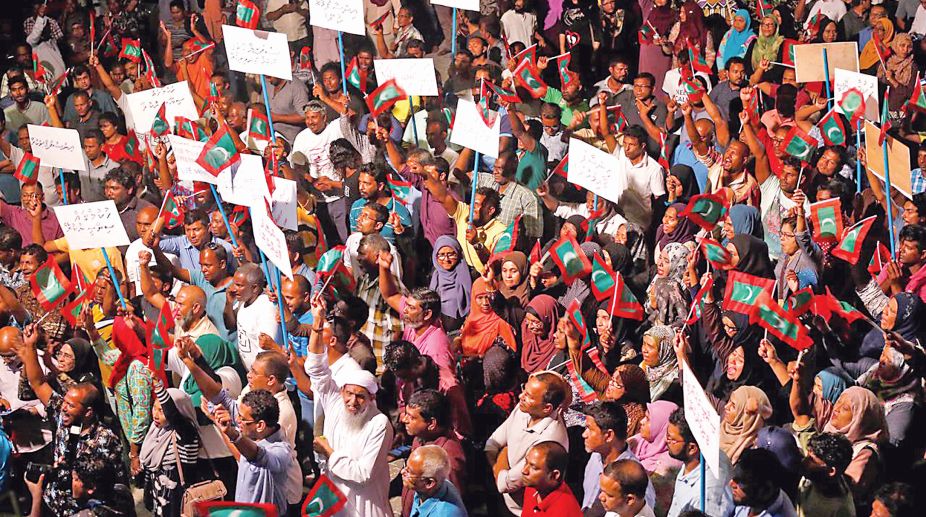Supreme Court rejects 100 per cent cross verification of EVM votes with VVPAT slips
The top court also rejected the prayers of petitioners to return to ballot paper voting system, calling it foible and unsound.

Maldivian crisis
The crisis in Maldives escalated last week after President Abdulla Yameen declared a fifteen-day emergency, following a Supreme Court ruling allowing for the release of nine political opposition leaders and reinstatement of membership of twelve Members of Parliament (MPs). Since then, his predecessor and half-brother, Maumoon Abdul Gayoom and two of the five Supreme Court judges have been arrested.
Yameen has increasingly become authoritarian since his election in 2013. He swifty jailed opposition leaders, sentenced his Defence Minister and Vice President, took control of the ruling party that was being contested by Abdul Gayoom and made it impossible, through a Supreme Court ruling, for MPs to defect to the Opposition.
Ergo, it came as a surprise when the Supreme Court in effect ruled against him by restoring the twelve “defector” MPs, pushing Yameen’s party into a minority in the 85-member house. The order signalled a potential return of former exiled President Mohammed Nasheed. The timing is significant as presidential elections are expected later this year.
Advertisement
Nasheed in a tweet requested “India to send (its) envoy, backed by its military” to release political detainees and restore normalcy. He also asked the US to “stop all financial transactions of Maldives regime leaders”. In this context, would it be wise for India to interfere? Diplomatically, yes, but militarily — there is no need as yet.
India has been and must continue to use all diplomatic tools available to it to ensure that the orders of the Supreme Court are followed, as it is in India’s strategic interest to do so. Firstly, Maldives is theoretically still a democratic country, a value that India shares and upholds. Secondly, India still enjoys enormous goodwill in the Indian Ocean archipelago and cannot afford to lose it. Thirdly, India will gain the most if Yameen resigns, a new government is elected and democracy is brought back fully.
It is no secret that Yameen’s government has been growing closer to China despite Maldives and India sharing deep, historical bonds. India has traditionally been the influencer and while it still continues to play a role, it is slowly being overshadowed by China.
The most recent instance was the passing of a Free Trade Agreement between Maldives and China, through Parliament in the absence of the Opposition and without much debate. The Yameen government also endorsed China’s Maritime Silk Road, a part of its Belt and Road infrastructure project.
Therefore, China’s growing influence in the region needs to be carefully accounted for in India’s strategy towards Maldives.
India views the Indian Ocean as its bailiwick and is wary of China’s attempts to spread its influence in the region. India was slow in getting off the block in Sri Lanka and allowed China to bag the strategic Hambantota port. A redo in the Maldives eats into India’s sphere of influence.
For instance, in 2016 the Maldivian government cancelled GMR group’s airport contract and controversially awarded it to Beijing Urban Construction Group. Naturally, India’s security is an important feature of its foreign policy toward the region. Therefore, it is right in continuing to be concerned about the “disturbing” situation unfolding in Maldives and in issuing travel advisories to its citizens.
Travel advisories are generally looked at as a ‘soft’ diplomatic tool that can influence states. Considering Maldives’ dependency on tourism this is a smart tactic. India can lobby other states to issue similar travel advisories. Beyond this, India can also issue economic sanctions that will work in its favour but must keep in mind lessons from the Madhesi economic blockade in Nepal in 2015 where India was hugely unpopular.
While these soft power tools go a long way, it does not mean that India should rule out the use of hard power. India successfully prevented a coup in 1988 and can easily do so again. Nevertheless, the circumstances were different then — Abdul Gayoom, the then President, had explicitly asked for India’s help, the coup was averted and Indian forces withdrew, culminating in international applause for India.
In the present situation, there has been no direct call for help from the Maldivian government. In such a scenario India will benefit from taking a more cautious stand as with any military involvement the first consideration should be if Maldivians want it. After all, no country wants to be perceived as an unpopular invading force.
However, situation demanding, were it to resort to hard power, it is likely that the United States and the United Kingdom will support India, but it is equally likely that China will condemn any such use of force. Since Yameen enjoys the support of China, it is possible that it will veto any United Nations involvement.
India must be careful not to rile China and must step in gingerly. However, if the emergency is extended, if Indian expatriates are affected and if India’s interests are at stake, India may consider using military intervention to preserve its interests in the region. Instead of taking unilateral decisions, India is adopting a very mature policy by discussing with other nations such as the U.S. and China and must be aware that its decisions will reflect its capability as a de facto leader in the region.
The writer is associated with the India Foundation.
Advertisement